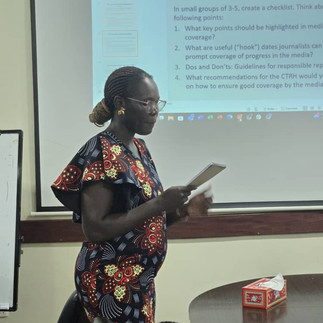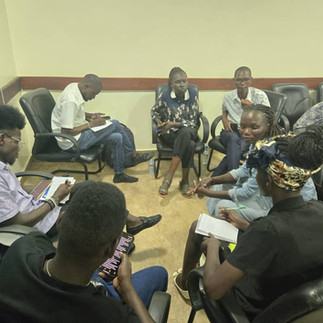“Our people at the grassroots need sensitisation about laws and the TJ process,”: Women Leaders Call for Transitional Justice in South Sudan
- Mariana Goetz

- Jun 19, 2025
- 3 min read
Updated: Jun 30, 2025
May 2025 - Juba, South Sudan
“Our people at the grassroots need sensitisation about laws and the TJ process,”
" Women suffered a lot in the conflicts, and many have gone silent. This briefing is an eye-opener ... we will come out as women to express ourselves."
- Participant, Women Leaders Tech Briefing, 28 May 2025
Over the past two weeks, the Council of Churches Compound in Juba was transformed into a space of collective reflection, learning, and commitment to action. Through two impactful technical briefings organized by Rights for Peace, under the auspices of the Supporting Survivors Empowerment through Advocacy and Reparative Measures (SEAR) Project, South Sudanese journalists, women leaders, persons living with disabilities, and religious representatives came together to explore their roles in the country’s transitional justice process.
The message was shared: justice must be inclusive, informed, and driven by those it seeks to serve.
Women and Community Leaders Speak Out
The conversation was led by underrepresented voices. Women leaders, religious figures, and representatives of persons with disabilities spoke out.
Thirty women, including parliamentarians from the Transitional National Legislative Assembly (TNLA) and the Council of States, gathered to reflect on their role in seeing Transitional Justice mechanisms come to life. Two new laws to establish a Commission for Truth, Reconciliation and Healing (CTRH) and a Compensation and Reparation Authority (CRA) were adopted on 11 November 2025. The women leaders want to see that the 35% affirmative action quota for women in key roles is not just met but made meaningful.
“We need to forgive and reconcile with each other and start a new beginning, but also it's important to discipline those who misbehaved and hold them accountable,”
said Jackline Nasiwa, Executive Director of CIGPJ in her opening remarks.
“Victims must be acknowledged, and women must lead the peace and reconciliation process.”
As discussions unfolded, concerns were raised about political exclusion, the lack of consultation within religious platforms, and the importance of grassroots sensitization. Best practices were shared to make sure the CTRH adopts provisions and practices for and defined by women.
“Our people at the grassroots need sensitization about laws and the TJ process. As parliamentarians, we need to take this opportunity to create awareness in our communities.”
Participants committed to sharing information widely and backing capable women who intend to apply for roles in the CTRH. The emphasis was clear: solidarity over division.
Journalists Step into the Story
With participants drawn from media houses, freelance circles, and journalist unions, this second technical briefing focused on empowering the media with knowledge and tools to report on transitional justice.
The group worked through a presentation using the Citizen’s Guide to Transitional Justice, and unpacked the timeline from the 2018 Peace Agreement to the laws signed in November 2024.
“ This briefing has been very important to us as journalists because we are the ones to take the information to the people… even though some of our communities don’t even have radios,” said one participant.
Journalists explored legal references to media in the new CTRH Act and collaboratively developed a list of reporting dos and don’ts, including protecting victim identities and avoiding politically charged language.
“The only way we can know what is happening in terms of TJ development is if you always involve us in events like this workshop,” another journalist remarked.
A Shared Commitment to Justice
Despite the differences in roles, whether it is behind microphones, or community pulpits and parliamentary desks, participants agreed: transitional justice in South Sudan must be collaborative, inclusive, and transparent. Journalists or woman leaders each has a stake in shaping the nation’s healing process.
Our advocacy is supported by the Global Survivors Fund, through the SEAR Project: “Supporting Survivors’ Empowerment through Advocacy and Interim Reparative Measures.”

























Comments